|

by Paul Cudenec
September 14, 2024
from
WinterOak Website

For readers primarily interested in my political writing, this
current exploration of the sophiological tradition via
the pages of
The Heavenly Country might not
seem terribly relevant.
But in fact the ideas I have been discussing here are of fundamental
importance for the building of our New Resistance against the
criminocracy.
Their pertinence to the great struggle ahead of us is, indeed,
expressed time after time in the pages of the book.
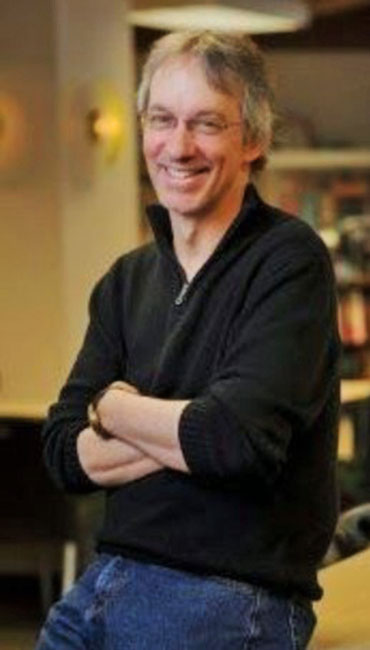
Editor Michael Martin (pictured) declares in the
introduction:
"We live in an age of untrammeled
superstition:
the hope that science will save us from
ourselves and bless us with prosperity and, even, that it
will allow us to overcome death.
"This is an age of the totalization of the
technological and
the technocratic, an age of the
unreal, the artificial, the illusory, of the simulacra". 1
"In this paradigm, the human person is viewed as a machine among
other machines, replete with updateable hardware, a myriad
number of applications, and the promise of replaceable as well
as changeable parts. I, human, iHuman...
"Accepting the human person as a machine ultimately distances
the human person from himself, from the awareness of himself as
a human person, as an integrally somatic, pneumatological and
existential being.
"Yet it is the machine model (though few have the
courage to name it as such) that is ascendant in our own
cultural moment.
"We see this perhaps most clearly in the burgeoning gender
reassignment industry, an industry not only of technological
application, but also now fully integrated into the political,
corporate, and entertainment complex". 2
Martin describes a long-term project of control
and transformation of matter that was initially directed outwardly
towards the exploitation of nature and the colonization of peoples.
He adds:
"It has now been turned onto the human
subject himself, oftentimes with individuals allowing their own
bodies to be colonized by the totalizing dictates of ideology".
3
Several ideas about how this historical process
started and developed are advanced by authors featured in the book.
Artur Sebastian Rosman sees a seed in certain kinds of
Protestant thinking, in which,
"God's transcendence of creation is
accentuated so as to almost form a complete break". 4
The poet Novalis, in his 1799 essay
'Christendom or Europe?', while acknowledging,
"the transitory blaze of heaven" in
Protestantism's beginnings, identifies a "corrosive influence"
which led us into an age in which "the worldly has gained the
upper hand". 5
He states:
"The history of Protestantism shows us no
great and splendid manifestations of the supernatural any more"
6 and argues that hatred of the Catholic Church had
gradually extended into hatred of the Christian faith, of
religion in general and then of
"all objects of enthusiasm".
"It made imagination and emotion heretical, as well as morality
and the love of art, the future and the past.
With some difficulty it placed man first in
the order of created things, and reduced the infinite creative
music of the universe to the monotonous clatter of a monstrous
mill". 7
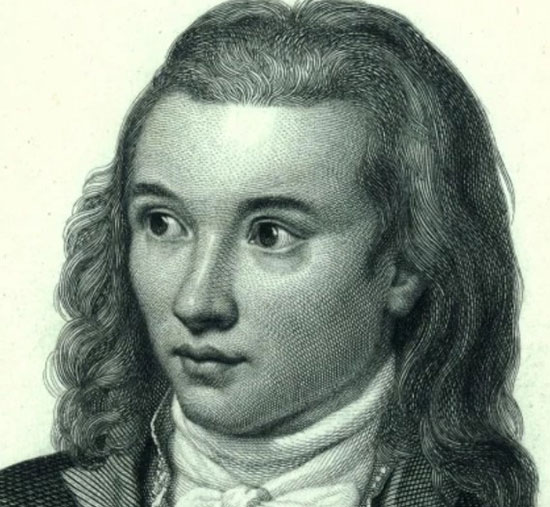
Novalis (pictured) depicts thinkers of the
Enlightenment as,
"tirelessly busy cleaning the poetry of
Nature, the earth, the human soul, and the branches of learning
- obliterating every trace of the holy, discrediting by sarcasm
the memory of all ennobling events and persons, and stripping
the world of all colorful ornament". 8
The flat and rigid thinking regarded as
"scientific" came to dominate our society, as Brent Dean Robbins
explains in his essay.
"In our technological world, the call
of the natural world, can get drowned out by the abstract
theoretical concepts that have increasingly come to replace our
receptivity to the concrete claims of the phenomena that compose
our life-world". 9
He says the Cartesian-Newtonian view, what
Johann Wolfgang von Goethe calls,
"the gloom of the
empirico-mechanico-dogmatic torture chamber", 10
...understands the world through a veil of
mathematics and regards human perception as untrustworthy.
"It performs, in other words, what
philosophers have come to call 'reductionism':
it comes to explain the world of human
experience by 'reducing' its meaning to causal events
'behind' the phenomena.
"For example, what you see are colors; but,
in reality, there are 'nothing but' waves of light.
Reductionism, in this sense, is the
disease of 'nothing-but-ness'.
'Nothing-but-ness' is another term for
nihilism". 11

A similar conclusion is reached by Bruce V.
Foltz, who argues that,
"we have a monstrous distortion of creation:
nature as something bereft of divinity
and grace... leaving qualities such as goodness and beauty
merely subjective labels". 12
Analyzing the work of novelist Fyodor
Dostoevsky, he identifies a series of,
"unhappy, disappointed, Westernized
intellectuals" in his fiction.
"These are figures whose hearts have been corrupted by their
thoughts and by their attachment to their thoughts, and for whom
created nature is an object of contempt (the battered and bitter
Underground Man, for whom it is a realm of dumb necessity) or
revulsion (Raskolnikov, who from within the Hell of his own
making experiences nature as scorching and sulfuric, i.e., as
itself infernal).
"These are nihilistic figures... cerebral, disembodied figures
(shades, perhaps) believing only in the reign of the Man-God,
humanity elevating itself to the status of world-creator".
13
Some go further than labeling this phenomenon
merely nihilistic.
Foltz points to Sergei Bulgakov's concept of a,
"diabolical economy... obscuring and debasing
and disfiguring original creation". 14
And The Heavenly Country editor Martin
evokes the powerful critique of modernity voiced by 20th
century Welsh poet David Jones.
"Like Heidegger, Steiner, Huxley, and so many
others who have raised concerns about the human, cultural, and
spiritual costs of our infatuation with technology, Jones argues
that we have made this technology into an idol, a
Moloch-like demon he calls
the Ram, and that this god demands the
instrumentalization and subsequent sacrifice of human persons".
15
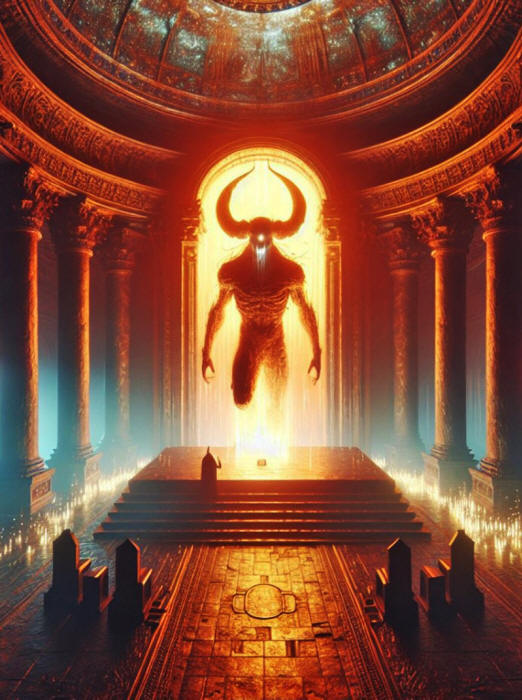
Martin describes Jones',
"condemnation of the anti-sophiology that
rules modernity, a modernity that can no longer recognize what a
human person is, what gender is, what marriage is or what is
real".
And he remarks:
"This is truly a modernity in which 'dead
forms multiply' and it is characterized by the fetishization of
sterility". 16
He also reminds us of Nikolai Berdyaev's
1935 warning that,
"the world threatens to become an organized
and technicized chaos in which only the most terrible forms of
idolatry and demon-worship can live".
And he adds,
"That day is here"... 17
So,
how are we to bring down the demon Moloch and
the modern techno-hell in which he has enslaved us?
Reviving and popularizing the natural-spiritual
perspective offered by sophiology could well be part of the answer.
Martin says his book,
"provides an antidote to the ontological
poison with which we have all been infected" 18 and
presents "a worldview that can heal the ontological,
teleological and epistemological wounds from which our age so
deeply suffers". 19
But the figure of
Sophia can also act as a dynamic
factor in our own relationships with existence, offering us guidance
on the path to what Foltz terms Katharsis (purification of the
heart) and a subsequent metanoia (change of heart) that would
allow us to experience the sacred presence in nature and in others.
20
He insists:
"Only when we apprehend nature as divinely
instituted, i.e., see it as creation, are we able to learn from
it, to sense the divine wisdom interwoven throughout it.
"That is, only by means of askesis (understood not
primarily as fasting and vigils, but purification of the heart)
can nature be seen deeply and the divine wisdom reigning within
it be revealed". 21
To reach this understanding, this gnosis, we need
to be open to inspiration, writes 20th century theologian
Hans Urs von Balthasar (pictured),
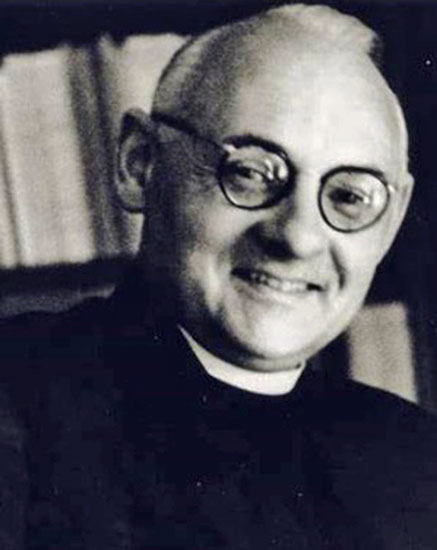
"a moment when the 'spirit that contains the
god' (en-thusiasmos) obeys a superior command which as such
implies form and is able to impose form". 22
"Such creative form, then, is God's work, and the work of man
only in so far as he makes himself available to the divine
action without opposition, allowing God to act, concurring in
his work.
"Such 'art' becomes visible in the Christian sphere in
the life-forms of the chosen.
In its exact sense, prophetic existence is
the existence of a person who in faith has been divested of any
intent to give himself shape, who makes himself available as
matter for the divine action". 23
The divine action for which we all need to make
ourselves available is that of fighting the evil of the dark
enslaving empire that today dominates our society.
And the potential role of Sophia in inspiring us in this task is
portrayed in the words of the 17th century English mystic
Jane Lead, whose visionary encounter with "God's Eternal
Virgin-Wisdom" is described in the first of these essays.
Sophia warns of,
"the Dragon and the Beast, with all his
horned power... which the whole World hath worshipped and
admired".
This vile entity,
"hath long had his Time, to impose strange
Laws, and Injunctions and hath been in Universally obeyed".
Sophia declares that,
"Sorceries, Witchcrafts, and Deceits have
worn out many Generations, who was ignorant of the Depths of
this subtle Serpent" and have tricked them into accepting "this
false usurped Power and Authority". 24
Sounds familiar...!
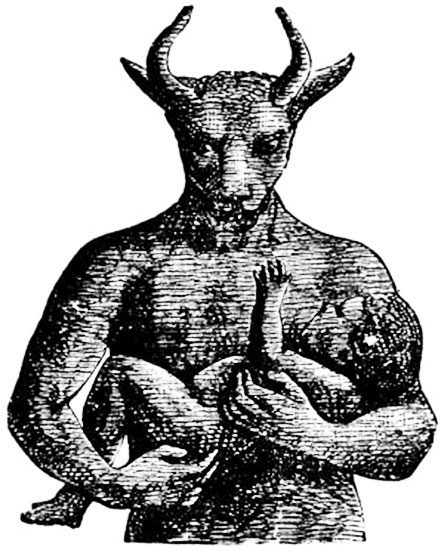
But she tells Lead:
"Be of good comfort, the Judge is nominated,
the Jury is chosen, by whom the Verdict will be given; therefore
be true to the Interest of my Son, who is appointed to judge the
World in thee, and to cast out Hell, Sin and Death, the Beast
and his retinue into the Lake, where there shall be no return
out thence, to assault thee with their Dregs and Poisonous
Floods.
"This is to be done by joining Issue and Power with me, whom am
come to help thee against the great Leviathan, who makes war
most, where he sees his Time of Reigning is almost worn out, and
that he must have no more place". 25
There is a definite compatibility between all
this and my own version of Sophia, whom I introduced in the opening
essay.
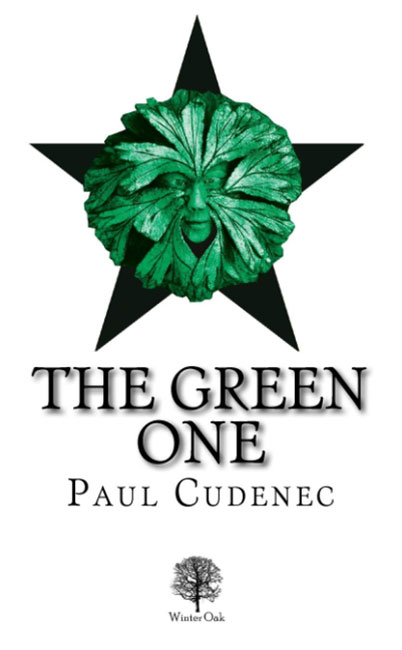
I present here
The Green One's concluding
statement as a parting encouragement, ahead of the completing
footnote to this three/four-part series.
"I have been called to action and will not
cease from mental fight.
I ride into battle,
-
as Tammuz and Pachamama
-
as Great Pan and Grandmother Spider
-
as Brigid and Jack in the Green
-
as Diana and Dikaiosune
-
as Joan of Arc and the Queen of
Elphame
-
as Cybele and Dionysus
-
as Oshún and Oannes
-
as Dodola and Jarilo
-
as viriditas and asha...
"And I ride into battle as much more than
these.
I am not just the sum of their parts, but the
understanding of how they all represent the same vital force
emerging through the human mind - the understanding, too, that
this understanding is important and that it is itself part of
the eternal wisdom of humanity, the Sophia Perennis.
"I am Sophia Perennis in active mode, in revolutionary mode, in
the mode of destroying all that stands in the way of my
reinstatement as the foundation of your thinking and your
living.
"I am your determination to ditch the dead-souled industrial
mindset that blocks your future". 26
References
-
Michael Martin, 'Introduction: Sophiology:
Genealogy and Phenomenon', in
The Heavenly Country - An Anthology of
Primary Sources, Poetry, and Critical Essays on Sophiology,
edited by Michael Martin (Kettering, Ohio: Angelico
Press/Sophia Perennis, 2016), p. 1.
-
Ibid.
-
Martin, 'Introduction', in The Heavenly
Country, p. 2.
-
Artur Sebastian Rosman, 'The Catholic
Imagination: A Sophiology Between Scatology and
Eschatology', in The Heavenly Country, p. 380.
-
Novalis, 'Christendom or Europe?', in The
Heavenly Country, p. 91.
-
Ibid.
-
Novalis, 'Christendom or Europe?', in The
Heavenly Country, p. 93.
-
Novalis, 'Christendom or Europe?', in The
Heavenly Country, p. 94.
-
Brent Dean Robbins, 'New Organs of
Perception: Goethean Science as a Cultural Therapeutics', in
The Heavenly Country, p. 325.
-
Quoted in Erich Heller, The Disinherited
Mind: Essays in Modern German Literature and Thought
(Cambridge: Bowes and Bowes, 1952), p. 18, cit. Robbins,
'New Organs of Perception', in The Heavenly Country, p. 319.
-
Robbins, 'New Organs of Perception', in
The Heavenly Country, pp. 316-17.
-
Bruce V. Foltz, 'Nature and Divine
Wisdom: How (Not) to Speak of Sophia', in The Heavenly
Country, p. 359.
-
Foltz, 'Nature and Divine Wisdom', in The
Heavenly Country, p. 356.
-
Foltz, 'Nature and Divine Wisdom', in The
Heavenly Country, p. 374.
-
Michael Martin, 'The Poetic of Sophia',
in The Heavenly Country, p. 400.
-
Martin, 'The Poetic of Sophia', in The
Heavenly Country, p. 401.
-
Nicolas Berdyaev, The Fate of Man in the
Modern World, trans. Donald A. Lowine (1935, reprt. Ann
Arbor, Michigan: The University of Michigan Press, 1961), p.
127, cit. etc Martin, 'The Poetic of Sophia', in The
Heavenly Country, p. 388.
-
Martin, 'Introduction', in The Heavenly
Country, p. 2.
-
Martin, 'Introduction', in The Heavenly
Country, p. 5.
-
Foltz, 'Nature and Divine Wisdom', in The
Heavenly Country, p. 356.
-
oltz, 'Nature and Divine Wisdom', in The
Heavenly Country, p. 363.
-
Hans Urs von Balthasar, 'The Glory of the
Lord: Volume 1: Seeing the Form', in The Heavenly Country,
p. 138.
-
bid.
-
Jane Lead, 'A Fountain of Gardens', in
The Heavenly Country, p. 79.
-
Jane Lead, A Fountain of Gardens, p. 78.
-
Paul Cudenec,
The Green One (Sussex,
Winter Oak, 2017), pp. 185-86.
|









